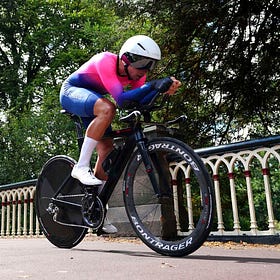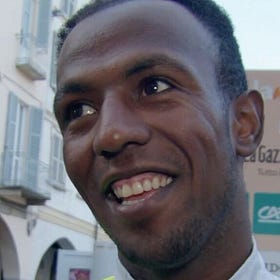Why the new breed of wonderkids is bad for global cycling
'Right off the bat it felt like you were playing catch up'. Teams need to look differently at riders from lesser developed cycling backgrounds.

We've all seen the rise of the young cycling phenoms over the past few years. It seems that at almost every race a new 18-year-old prodigy bursts onto the scene. This has been particularly evident in the men's peloton, but even now in the women's sport it seems inevitable that riders like Cat Ferguson - soon to race for a WorldTour team at 17 - will inevitably take over.
Much has been written about the reasons behind this seismic shift. In Europe, teenagers have more access than ever before to elite training techniques, top equipment and competitive racing. There is a case of one rider in the UK who has been picked up by an agency and supported by a WorldTour team at just 14 years old. The resources available to him to launch into a top career are endless.
The perspectives of teams are changing. Riders used to turn professional at 22 with space and flexibility to develop. Now riders of the same age are considered too far gone, dismissed despite having not even made it to full physical maturity as teams chase the next up and coming teenager.
That's a challenge to the diversification of cycling. Riders from Africa, Asia, Central & South America and even parts of Europe don't have the access to the same resources as the Belgians or Brits. This means that a 20-year-old Nigerian is at a very different phase of their development to a rider from Netherlands of the same age.
The big problem here is that teams and those decision-makers who build or break careers aren't seeing the difference. A 19-year-old from Thailand has probably only started to train properly in the last 12 months and doesn't have the same equipment as a 19-year-old from France. They are unlikely to compete with the French cyclist now, but they have more room to grow.
I remember speaking to Kaden Hopkins a couple of years ago after he finished a breakthrough 11th at the Commonwealth Games time-trial for Bermuda.
Hopkins told me "growing up where I did, people always used to say: 'you're from Bermuda, you won't be a pro cyclist.' I would see, in Europe, 18 year-olds already winning races against the pros and getting contracts. Right off the bat it felt like you were playing catch up. Being from such a small place and being so far from Europe, it's not as easy to get into a bigger racing scene."
Hopkins, now 24, is riding for French amateur team Vendée U, feeder team to professional squad Total Energies. It has taken Hopkins more time, but he is in a place where a few good performances in the next few months could net him a pro deal.
GP Archive - Kaden Hopkins: A Bermudian trying to make it in Europe
Kaden Hopkins is part of an emerging group of talented riders from the Caribbean. Growing up on the small island of Bermuda in the middle of the Atlantic ocean, Hopkins had to work hard to get his opportunity to race in Europe. "Growing up where I did," says Hopkins, "people always used to say: 'you're from Bermuda, you won't be a pro cyclist.' I would se…
Are riders like Hopkins worse cyclists than their western European peers? Or do they just start from a different place? In other words, is there an inequality problem at the grassroots of cycling? The answer has to be ‘yes’.
The solution is to stop looking at the age of a rider from a nation like Burkina Faso or South Korea, instead look at their stage of development.
OK fair enough, age does come into it at some point. There are plenty of 30-year-olds smashing it on their local scene who may have become something if they had been picked up half a dozen years ago, but they are realistically too old now. However, look at the riders in their early and mid 20s; the likes of Awa Bamogo, Thanakhan Chaiyasombat, Paul Lomuria - three riders who have bags of talent. They are not done yet, they could still become solid riders in their own right, given the chance.
Of course, I am oversimplifying things a bit. There are other factors in play such as visas and team budgets, but the sentiment still stands.
Sadly as things are, they will be dismissed, because 24 is now ancient in cycling years.
If a few more people add paid subscriptions to Global Peloton I will be able to share more stories of global professional cycling. If you can afford it, please consider adding a paid subscription.
Latest paid post:
'It's not easy to handle' - Biniam Girmay opens up about the pressures of expectation
Ever since that famous March afternoon in 2022, when Biniam Girmay held hands aloft becoming the first black rider to win a classic at Gent-Wevelgem, the cycling world has expected great things from the Eritrean. Not least his Eritrean fans, who follow him to every race, hoping for a glimpse of greatness.
Thanks for reading Global Peloton!
If you enjoyed this post, please consider sharing.
Or, you can Buy Me a Coffee




This is an excellent point which I haven’t seen made before. There’s a tension in the sport between the financial imperative of industry growth in new markets and the inequalities born of colonialism.
Love the newsletter, thanks